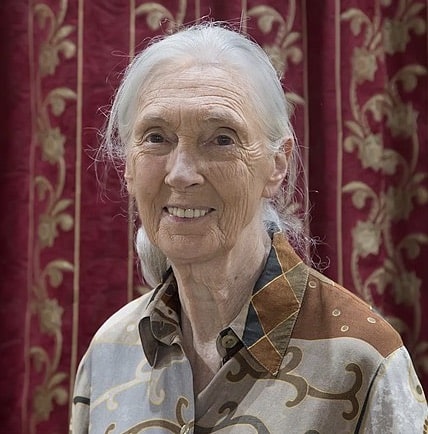Valerie Jane Morris-Goodall was born on April 3, 1934 in London, England. When she was young, her father gave her a stuffed chimpanzee as a plush toy. Whether this stimulated an emotional attachment to our fellow primates is not known, but shortly after Jane reached the age of 23, she traveled to a friend’s farm in the highlands of Kenya. Seeking a job to support herself, she contacted Louis Leakey, an archaeologist and palaeontologist who employed her as a researcher in the neighbouring country of Tanganika (now Tanzania).

In the following year, 1958, Leakey sent Goodall to London where she studied primate behaviour with Osman Hill and primate anatomy with John Napier. In July 1960, Goodall returned to Africa and was assigned by Leakey to work in Gombe Stream National Park where she became the first female researcher in primatology. Then, in 1962, Leakey arranged funding for Goodall’s travel to Cambridge where she studied for her Bachelor of Arts degree in the natural sciences. Jane emerged 4 years later with a Ph.D. in ethology after defending her thesis titled, Behaviour of Free-living Chimpanzees, using information she had collected during her five years of study at the Gombe Reserve.
Through her exhaustive observation of chimpanzees, Jane revealed that chimpanzees are much closer to humans in their behaviours than previously believed. She recorded their expressions of joy, sorrow, hugging, tickling and mutual grooming. She also observed the variation of personalities among individuals and the rituals of bonding and competition that parallel human social conventions. Jane’s frequent observations of chimpanzees using sticks and straws to extract termites from a mound destroyed the myth that Homo sapiens is the only species that can use tools,
She also overturned the belief that chimpanzees are vegetarian, when she observed chimps systematically hunting, killing and eating the smaller colobus monkeys. Although she originally believed that chimpanzees were gentler creatures than their human cousins, further observation brought her to the opposite conclusion–an eye-opening revelation that she shared in her 1990 memoire, Through a Window: My Thirty Years with the Chimpanzees of Gombe.
In 1977, Jane Goodall established the Jane Goodall Institute to support Gombe research and protect chimpanzees and their habitat Expressing her life’s mission that spanned more than 60 years, she stated, “The least I can do is speak out for those who cannot speak for themselves.”
